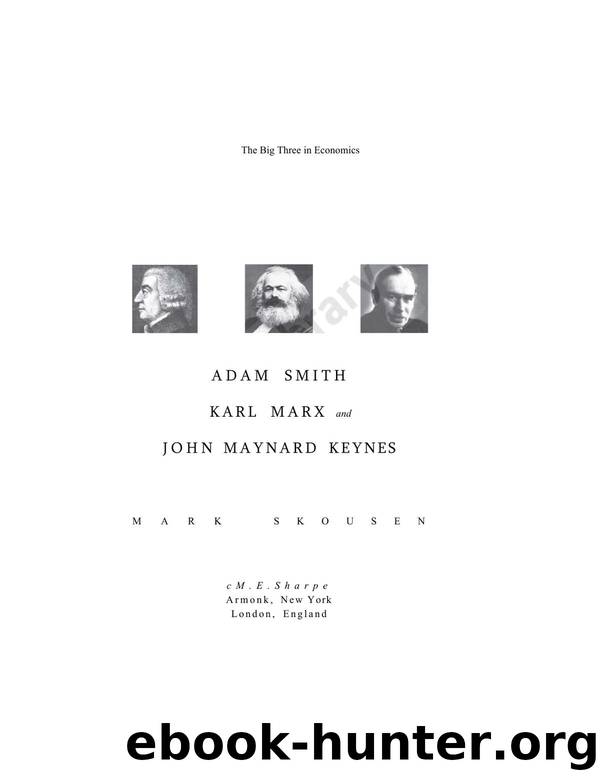The Big three in Economics by Mark Skousen

Author:Mark Skousen
Language: eng
Format: mobi, epub
Tags: economics, marx, skousen, adam smith
Published: 2011-04-17T23:02:07+00:00
Figure 5.1 Aggregate Supply (AS) and Aggregate Demand (AD) Model from a Keynesian Perspective
p
Source: Byrns and Stone (1987: 311). Reprinted by permission of Scott, Foresman and Co.
forces—which we can characterize as Wall Street—interact with production and consumption to determine output, employment, and prices" (1986,100). Allan H. Meltzer at Carnegie Mellon University offers a similar interpretation, that Keynes's theory of employment and output was not so much related to rigid wages and prices as to expectations and uncertainty in the investment and capital markets (Meltzer 1988 [1968]).8
Numerous passages in The General Theory support this view.
Keynes complained of the irrational short-term "animal spirits" of speculators who dump stocks in favor of liquidity during such crises.
Such "waves of irrational psychology" could do much damage to long-term expectations, he said. "Of the maxims of orthodox finance none, surely, is more anti-social than the fetish of liquidity, the doctrine that it is a positive virtue on the part of investment institutions to 8. See also my version of this thesis in "Keynes as a Speculator: A Critique of Keynesian Investment Theory," in Skousen 1992: 161-69.
concentrate resources upon the holding of 'liquid' securities" (1973a
[1936], 155). According to Keynes, the stock market is not simply an efficient way to raise capital and advance living standards, but can be likened to a casino or a game of chance. "For it is, so to speak, a game of Snap, of Old Maid, of Musical Chairs—a pastime in which he is victor who says Snap neither too soon nor too late, who passes the Old Maid to his neighbor before the game is over, who secures a chair for himself when the music stops" (1973a [1936], 155-56).
Keynes was speaking from experience. He reasoned that the 1929-33 crisis destroyed his portfolio without any rational economic cause—the panic was due to Wall Street's irrational demand for cash, what he termed "liquidity preference" and a "fetish of liquidity"
(1973a [1936], 155).
The Culprit: Uninvested Savings
If Keynes were Sherlock Homes, the economist-investigator would point an accusing finger at Miss Thrifty in his murder mystery,
"The Case of the Missing Savings." In Keynes's model, the key factor causing an indefinite slump is the de-linking of savings and investment. If savings failed to be invested, total spending in the economy would fall to a point below full employment. If savings were hoarded or left in excessive reserves in the banks, as was the case in the 1930s, the fetish for liquidity would make national investment and output fall. Thus, thrift no longer served as a dependable social function.
In The General Theory, Keynes argued that as income and wealth accumulate under capitalism, the threat grows that savings will not be invested. He introduced a "psychological law" that the "marginal propensity to save" increases with income (1973a [1936], 31, 97).
That is, as individuals earn more income and become wealthier, they tend to save a greater percentage of their income. Thus, there is a strong tendency for savings to rise disproportionately as national income increases. But wouldn't a growing capitalist economy always be under pressure to invest those increased savings? Keynes responded, "Maybe, maybe not.
Download
This site does not store any files on its server. We only index and link to content provided by other sites. Please contact the content providers to delete copyright contents if any and email us, we'll remove relevant links or contents immediately.
Hit Refresh by Satya Nadella(9122)
When Breath Becomes Air by Paul Kalanithi(8424)
The Girl Without a Voice by Casey Watson(7883)
A Court of Wings and Ruin by Sarah J. Maas(7810)
Do No Harm Stories of Life, Death and Brain Surgery by Henry Marsh(6933)
Shoe Dog by Phil Knight(5256)
The Rules Do Not Apply by Ariel Levy(4956)
A Higher Loyalty: Truth, Lies, and Leadership by James Comey(4948)
Hunger by Roxane Gay(4921)
Tuesdays with Morrie by Mitch Albom(4767)
Everything Happens for a Reason by Kate Bowler(4729)
The Immortal Life of Henrietta Lacks by Rebecca Skloot(4571)
Millionaire: The Philanderer, Gambler, and Duelist Who Invented Modern Finance by Janet Gleeson(4464)
How to Change Your Mind by Michael Pollan(4355)
All Creatures Great and Small by James Herriot(4308)
The Money Culture by Michael Lewis(4196)
Man and His Symbols by Carl Gustav Jung(4127)
Elon Musk by Ashlee Vance(4120)
Tokyo Vice: An American Reporter on the Police Beat in Japan by Jake Adelstein(3977)
